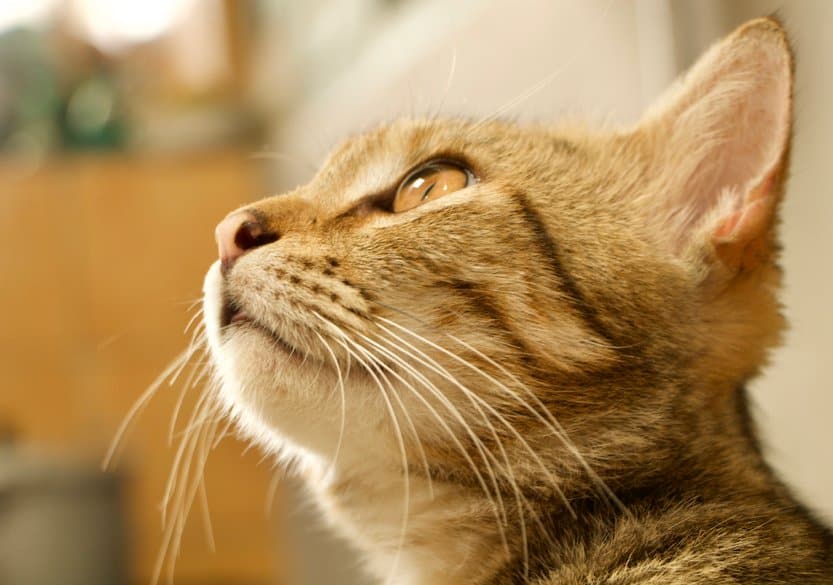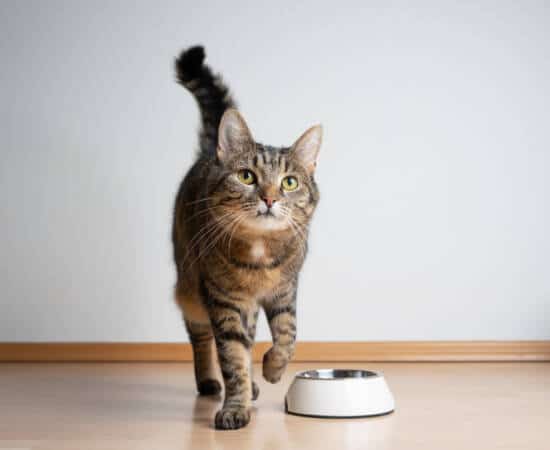8 Reasons Why Cats Meow [Plus FAQs & 8 Types of Meows]

Cats meow as a way of communicating with humans, but not all cat meows are the same.
There are different types of meows and the reasons for each can range from a simple greeting to an underlying health condition. Some breeds may be more vocal than others, and certain situations may cause a cat to be more talkative than usual.
From trills and chirps to yowls and howls, read on to learn why cats meow, how to stop a cat from meowing and the different types of meows.
- 8 Reasons Why Cats Meow
- How to Stop a Cat from Meowing
- 3 Things Not to Do
- When to Take Your Cat to the Vet
- 8 Types of Sounds Cats Make
- FAQs
8 Reasons Why Cats Meow
- They want attention or they’re lonely
Dogs aren’t the only ones who enjoy attention from their humans. Cats can be social too, and they will vocalize their need for attention until they get it. They may meow when they want you to pet them, if they want to play or even if they just want you to talk to them.
The ASPCA says that "cats who are left alone for long periods of time each day may be more likely to meow for attention." Maybe you came home from work and didn’t give your cat a proper "hello" or maybe they just need some extra playtime.
The transition from being an outdoor cat to an indoor cat could also inspire excessive meowing. As your cat makes the adjustment to life indoors, they may be vocal near doors when they want to go out.
2. They’re sick
Some illnesses, like kidney disease or an overactive thyroid, can cause cats to become extra vocal. Fetch by WebMD says "numerous diseases can cause a cat to feel hunger, thirst, or pain, all of which can lead to excessive meowing." A trip to the veterinarian can help you find answers.
3. They want food
Have you noticed your cat meowing more around feeding time? Some cats will become more vocal when they know mealtime is approaching as a way to remind you to feed them. If your cat meows every time you walk into the kitchen, it’s because she’s learned to use her meow as a way to beg for food.
4. They’re greeting you
A quick meow is your cat saying hello. They might do this when you come home from being away for a few hours or when they enter the same room you’re in.
5. They’re stressed
If there’s been a change in your cat’s environment — like a move, a new baby, a new pet, etc. — they may meow more as a sign of stress.
6. Their age
As cats age, they may meow due to confusion or cognitive dysfunction. Fetch by WebMD explains that these conditions can cause a cat to become disoriented and emit a melancholy cry for no apparent reason, especially at night. This is another instance where a trip to the vet is necessary.
7. It’s mating season
Unaltered cats (those not spayed or neutered) will make drawn-out meows (yowls) during breeding season. This is their way of communicating with each other — females yowl when they are in heat and males will yowl when they smell a female in heat. Getting your cat spayed or neutered will solve this yowling issue.
8. It’s nighttime
Nighttime meowing is common and frustrating, but contrary to popular belief it’s not because cats are nocturnal. They are crepuscular, which means they are most active at dusk and dawn.
ModernCat notes that many cats’ internal hunting clock is set for between 3 a.m. and 5 a.m., which may cause early morning vocalizations. If your cat wasn’t active enough during the day, they will also be more awake at night and more likely to meow for attention. Additionally, if your cat’s last meal of the day was too early, hunger might cause them to wake up earlier in the morning.
How to Stop a Cat from Meowing
It’s important to know that most cats will meow to some extent whether or not there is an issue. Some cats are just talkative and there may not be anything you can do to stop them from meowing.
What you can do is figure out why your cat is meowing, determine if it’s an issue that requires a vet visit and find a way to make both you and your cat more comfortable. Here are a few tips:
- Attention and loneliness meowing
Cats meowing for attention may just need some petting or playtime. However, if the demand for attention becomes too much, try rewarding quiet behavior. Your cat will pick up on this and hopefully cut back on the meowing.
If you’re gone for long periods of time during the day, make sure your cat has toys to keep them entertained. Catnip toys, cat tunnels and interactive toys are all options that cats can play with by themselves. For more ideas, check out a list of the best interactive cat toys from MyPetNeedsThat.com.
If you think your cat is meowing because of loneliness, consider getting a pet sitter during the day, another cat or a pet camera to dispense treats when you’re gone for long periods of time. When you get home, make sure to give your feline a warm welcome, some scratches behind the ear and maybe even a treat.
2. Illness or age-related meowing
A trip to the vet is warranted any time you suspect something may be off with your cat. They will check your cat’s cognitive functions and may be able to prescribe medication to help your cat feel more comfortable.
3. Feeding-time meowing
Feeding a cat every time they meow only rewards their excessive vocalizations and it gives them added incentive to keep meowing when they want something.
It’s important to stick to a feeding schedule to set your cat’s expectations. You can also try an automated feeder if the meowing continues, although they might just direct their meows to the machine.
A new diet or feeding schedule might make your cat extra chatty. They will just need time to adjust to their new food or the new routine.
4. Stress meowing
During or after a stressful event, you can make your cat more comfortable in several ways. Some cats respond well to extra attention from their humans, while others may just need a quiet place to hide for a bit.
You might also consider talking to your vet about anti-anxiety medication for your cat. Before moving into a new house, a thunderstorm or an event that you feel might be stressful, you can give your cat the medication to help make the situation easier for them. Always use medication as prescribed by your vet.
There are also over-the-counter and natural stress relief options. The FELIWAY diffuser releases pheromones to create a calm and secure environment for cats, and can also help with over-grooming, scratching and urine spraying. You can browse more calming products for cats from the Chicago Tribune.
5. Mating meowing
All cats should be spayed or neutered to avoid excessive meowing related to natural breeding instincts.
6. Nighttime Meowing
ModernCat recommends keeping cats awake more during the day to avoid hyperactivity and meowing at night. If you work from home, playtime can be a nice break for both you and your cat, and it will keep your feline from over-napping.
The best way to control nighttime meowing is to avoid encouragement. This might mean ignoring it until your cat gets the hint, but it is an effective long-term solution. You can also try to reset your cat’s internal hunting clock by playing with cat toys in the evening or right before bed.
3 Things Not to Do
Dealing with an extremely vocal cat can be frustrating, but there are a few things to keep in mind as you work toward a solution. Here are a few things not to do from Fetch by WebMD:
- First, don’t ignore them
Sometimes excessive meowing can be due to illness or distress, or maybe your cat is trying to tell you something. Is their litter box dirty? Did they throw up somewhere? Could they have captured a mouse? If you can rule out these types of immediate problems, it may be time to take your cat to the vet for a proper checkup.
2. Don’t punish them
If you respond to your cat’s meowing by yelling, smacking or punishing them, this can create additional problems. Your cat may start to fear, dislike or distrust you because of how you react.
3. Lastly, don’t give in
If your cat meows every time you enter the kitchen, are you rewarding them by giving them a treat or a piece of your dinner? A cat that gets what they want every time they meow has no reason to stop. Instead, ignore the meowing and reward quiet behavior.
When to Take Your Cat to the Vet
To rule out any potential health issues, cats who show increased vocalizations should have a checkup with their vet.
As we mentioned, a cat could be meowing more than usual because of an illness, disease or age-related issue. The ASPCA also says, "even if your cat has a history of meowing for food, you should still have her checked by your veterinarian. As cats age, they’re prone to developing an overactive thyroid and kidney disease, and either one may result in excessive meowing."
While meowing is your cat’s way of communicating, there’s only so much you can understand. It’s always in your cat’s best interest to have unusual behavior evaluated by their vet.
8 Types of Sounds Cats Make
Just as humans whisper, yell, hum and use "indoor voices," every sound a cat makes has a purpose. Arden Moore, author of "The Cat Behavior Answer Book" says that "cats are capable of making at least 30 sounds, including at least 19 variations of the simple meow." Below are some of the most well-known sounds and what they mean.
- Meows
Meows are an all-purpose sound used as a greeting, objection or a command toward humans. The Humane Society says that "some people have observed their cats walking around the house meowing to themselves."
2. Purrs
Cats purr when they are content, when you are petting them or even when they’re eating. This is an internal vibration that some cats also use to comfort themselves when they feel stressed. If stress is the cause, the purr will be accompanied by pointed-back ears and a tense body.
3. Trills and chirps
If your cat is happy, excited or wants attention, they might make a quick little "blurp" sound. This is known as a trill or a chirp, and sometimes these can sound squeaky. Trills, chirps and purrs are considered cat murmuring sounds.
4. Chatter
When cats are watching prey — like birds outside of a window or one of their moving toys — they might make chattering noises as a sign of excitement.
5. Snarls, growls and hisses
Angry, scared or aggressive cats will snarl, growl or hiss. This is an indication that they are uncomfortable or ready to fight. To avoid being scratched or bitten, leave these cats alone to give them time to calm down.
6. Yowls and howls
These are long, drawn-out meows that you might hear if your cat needs help. They might have swatted a toy under the couch or are stuck in a closet. Yowls and howls can also be a sign that a cat is in pain.
7. Caterwauls
Mating calls made by unaltered females are classified as caterwauls. Modern Cat calls this noise an "abbreviated, plaintive, hollow-sounding version of a yowl [that] has an almost ‘ahh-roo-ugh?’ sound to it."
8. Screams
Females will scream during the mating process. All cats, unaltered or altered, may also emit shrieks and screams when in the midst of a fight with other cats.
FAQs About Cat Meowing
Q: Does age affect how much a cat meows?
A: Yes. Catster says that kittens meow to communicate with their mother, usually when they are hungry or uncomfortable. Mother cats will also meow back. Once kittens are weaned from their mother, meowing can subside.
When cats enter their senior years, they can become vocal again. There are several reasons why, including declining eyesight, illness or dementia. If you suspect that your cat could have any of these issues, you should schedule an appointment with your veterinarian.
Q: Do female cats meow more than male cats?
A: Not necessarily. However, intact cats (those who are not spayed or neutered) can be very vocal during breeding season.
Q: Do certain cat breeds meow more than others?
A: Yes. Some breeds — Siamese, Maine Coon, Siberian — are known for being very talkative.







